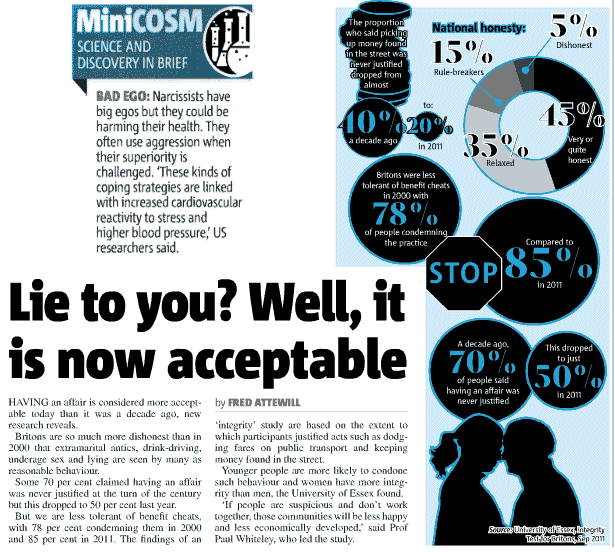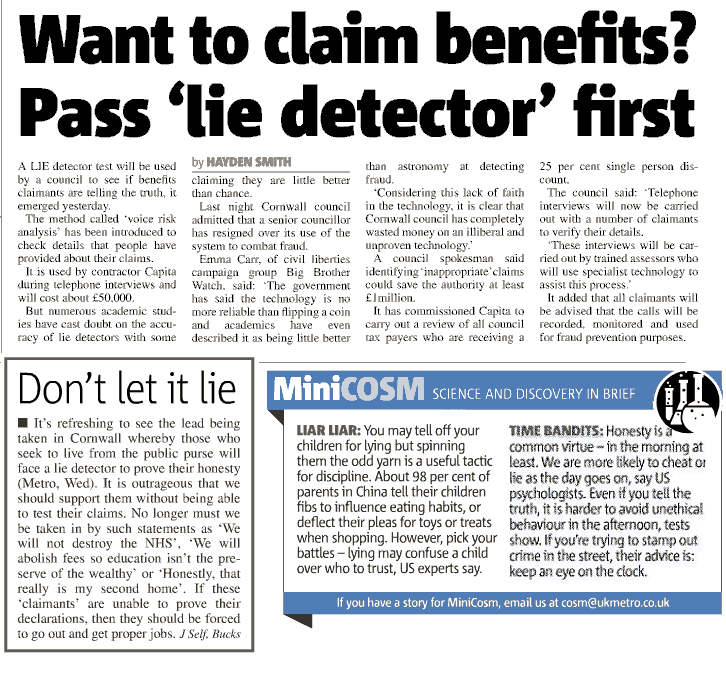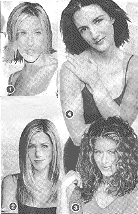BORN LIARS |
We disapprove of lying, but the uncomfortable truth is that human beings have evolved by deceiving each other.
Jerome Burne
ISN'T SHE ADORABLE," coo the visitors peering into the crib
of a newborn baby. Or 'Hasn't he got his father's nose!".
Chances are that they are
lying. Not necessarily about being adorable,
but almost certainly about Dad's nose.
That's according to new research reported just before Christmas which found
that, while mother and her relatives are very keen to find similarities between
baby and daddy, babies' faces are actually rather blank. In other words,
being able to spot the 'Smith nose' or the 'Jones cheeks' is pretty
unlikely.
So why the charade? It turns out that there is a lot more
involved than just being polite. We all have very mixed feelings about lying.
We are, of course, against it and we tut-tut when the porky-pies of serial
liars like Jeffrey Archer or Jonathan Aitken finally come to light. Yet,
we also appreciate that social, political and financial worlds couldn't function
without dollops of 'economy with the truth'.
We are intrigued by poker players and detectives, whose job it is to sort
truth from falsehood. Yet we feel queasy about lie-detecting machines, such
as the new American brain scan technique that claims to be able to spot
'guilty knowledge'.
As it turns out, we have deception hard-wired into our genes.
We are all descended from hominids who were successful liars. "One of the
reasons that we have such big brains is because we are good at deceiving
each other," says Dr Richard Byrne of St Andrews University. He's shown that
there is a link between how good members of a primate species are at manipulating
one another -cheating on mates, stealing food - and the size of their brains.
The bigger the better. Humans, it seems, have the biggest brains because
we are the biggest cheats and liars. It's called Machiavellian intelligence,
after the 16th-century Italian writer who advised rulers to use cruelty and
deceit to stay in power.
In our distant past, as today, men wanted to be sure they wouldn't
bear the cost of bringing up someone else's kid and there were no DNA tests
on the savannah. So it was, and still is, in both mum's and the baby's interest
to persuade him to stay around. So they have come up with a double whammy.
First of all, according to mathematical analysis produced by scientists
at the University of Padova, newborns are more anonymous looking than might
be expected. That is, they could resemble almost anyone. In fact, non-family
members do only slightly better than chance in matching baby to real dad.
But evolution favours women who can persuade the man that the baby is theirs.
The men might seem to lose out on this scenario, but there is a benefit.
It leaves them the chance of sneaking an extra child into another family.
At school the benefits of successful deception continue.
Researchers have found that the natural leaders in a playground proved to
be the kids who are also better at deceiving their playmates. And here's
a handy hint to bear in mind. The best deceivers did two things while they
were spinning their yarns: they were very serious and they looked their dupes
in the eye all the time.
But, and this is the intriguing part, on its own lying is not enough. A society,
even an ape one, in which everyone cheated and never kept their side of a
bargain just couldn't function. Besides being Machiavellian, humans are also
the most co-operative of species.
The best deceivers did two things while
they were spinning their yarns: they were very serious and they looked their
dupes in the eye all the time
One of the reasons we rule the world is that WE work together
on projects, from helping the neighbour with the shopping to building stone
monuments or atom smashers. Built into the genes of every one of us is the
result of an endless arms race between sophisticated fibbing and a finely
honed bulls**t detector.
Fooling around
We are only successful if we trust one another, but that lays us open to
being played for a sucker by a more Machiavellian neighbour. "We develop
better and better ways of spotting cheats," says Dr Stephen Pinker,
author of How the Mind Works, "while cheats work out ever-more subtle
ways to fool us. For instance, detecting cheats is one of the reasons for
our prodigious memory for faces and for the way we show emotions."
Getting angry as soon as you have been cheated,
for instance, may stop it from happening again. Liking is what you feel for
people you know you can co-operate with. Guilt or embarrassment shows you
are sorry and may save you from being banished or ostracised if and when
you are caught out. Much social activity involves a delicate balancing act
between fake and genuine emotions.
"We've evolved in a way that sham emotions are hard to do,"
explains Pinker. "That's because genuine emotions are a guarantee of keeping
promises. Real emotions are also hard to suppress, which also makes them
useful for detecting cheats. For instance, you need two muscles for a genuine
smile and only one of them is normally under conscious control. That makes
it that bit harder to convince people you are trustworthy when you are not."
The emotions of anger, fear and sadness also use muscles that are hard to
control voluntarily.
Detecting signs of these suppressed emotions leaking through
in dozens of subtle ways is the basis of many of our lie-detecting systems.
Paul Ekman, the world's top expert in reading facial expressions, has a favourite
video tape that shows Margaret Thatcher denying she had given permission
to torpedo the Argentinian cruiser General Belgrano. This later proved to
have been a lie. "You can see what we call a flutter, her eyes blinked very
rapidly five to six times in a row," says Ekman of the University of California,
San Francisco. "It's a sign that you're thinking a lot about what you are
saying."
Being aware of such unconscious giveaways can pay dividends
when it comes to poker. Raising someone £20 when you've only got a king
generates a lot of emotion and that comes out in what the professionals call
a 'tell'. Everyone's tell is different. It could be something very subtle
like a slight widening of the pupils of the eyes or a tiny change in the
pitch of your voice, or maybe you lean back in your chair or pull at your
ear lobe.
Even harder to control than your leaking
body, however, is your voice. Not what you say, but how you say it.
Dr Richard Wiseman at Hereford University has
found that when people are blindfolded they can spot the difference between
someone telling the truth and a lie about 75 per cent of the time, which
is a great improvement on the average rate of 50 per cent scored by such
'experts' as judges, detectives and CIA men watching a videotape. "Most people,
when they are lying, are rarely aware that they've started to speak more
softly or more slowly, or even louder or more quickly, than they normally
do," he says. A hi-tech version of this is a software program known as the
Verdicator that is being developed in Israel. Hook up your phone to your
computer and it will tell if your callers are lying. It claims to be between
85 per cent and 95 per cent accurate, and is yours for only $2,500.
Until recently, lie-detecting machines made use of our emotional leakage. The basic idea of the polygraph, which has been around for nearly 100 years, is that you hook people up to sensors that record their blood pressure, pulse, breathing rate and sweat and then ask them questions. Answers that cause a rise in the indicators are ones that trigger off strong emotions, the sort of emotions that often go with lying. But there is still a controversy over the fact that they are likely to wrongly point the finger at the anxious and miss the unemotional psychopath.
Thinking it through
But new hi-tech brain-scanning equipment may offer a way round this problem
by concentrating on thinking rather than emotions. Earlier this year an American
court heard evidence, for the first time, about something called 'guilty
knowledge'. Take the case of a murder suspect. If he's guilty then he knows
certain things that an innocent person does not. Maybe what the victim's
bedroom was like, or the distinctive shape of the murder weapon.
Brain scan studies have found a particular brainwave that
appears when you see something familiar. Called P300, it is like a click
of recognition and it's entirely automatic. So this new approach, known as
Brain Fingerprinting, developed by Dr Lawrence Farwell of the University
of Illinois in the United States, involves recording brainwaves from a suspect's
brain while showing them a mixture of unfamiliar objects and ones that suggest
guilty knowledge. "This method taps straight into the cognitive processes
of the brain," says Farwell, "and doesn't rely on any emotional reactions."
However, something far simpler may work just as well. The
speed of your reply may be as revealing as brainwave measurements. Researchers
at the University of Michigan have been showing people things that may or
may not be familiar and asking them to hit a yes or a no button. Subjects
who had been told to lie took twice as long to hit the button. So, a stop-watch
might be all the lie detector you need.
 |
Stronger by design |
| Women are supposed to be meek and modest. But is it genuine or a master stroke of manipulation? |
MEN ARE meant to be the arrogant sex frequently boastful and
overconfident about their abilities. Women on the other hand, are meant to
be mistresses of modesty - always putting themselves down and under-selling
their skills and attributes. If not the weaker sex, they are, traditionally,
the meeker sex.
But now research by two psychologists in the US has discovered that these
apparently sweet little traits are actually part of an armoury of subtle
strategies cleverly used to manipulate others. The psychologists, Bryan Gibson
and Daniel Sachau, reckon that far from being genuine and prompted only by
humility, self-deprecation is one of the most astutely manipulative skills
of all.
And there are many different, subtle ways of using modesty to your advantage,
according to Gibson and Sachau...
No contest
Sandbagging is a common tactic used by women. In order to lull any competition
into a false sense of security, they make themselves appear less competent
than they really are. So, if you're a sandbagger your opponents relax in
the assumption that they have the contest 'in the bag' because you're apparently
so hopeless. Of course, once you've adjusted everyone's expectations downwards,
you will look more impressive when you perform much better than anticipated.
Furthermore, you have no pressure to live up to high expectations.
Advantage: if you become nervous in pressurised situations, putting
yourself down and warning people not to expect too much takes away the pressure
of living up to high expectations - which is a more relaxing way of approaching
the spotlight.
Disadvantage: once you've used the sandbagging tactic a few times,
people will grow wise to your tricks and start to see the manipulation at
work behind them.
Modest success The aim of modesty as a manipulation tactic
is to be liked, particularly if you're good at something that is likely to
intimidate, alienate or make others jealous. Modesty is different to sandbagging
because it's about how you deal with your achievement once it's over, while
sandbagging is all about how you set up others' expectations beforehand.
There are several different ways of being modest: you could make out the
task wasn't as difficult as it appeared or that you 'got lucky'. The basic
trick is to place the responsibility for your success on any factor other
than your own ability. Modesty is a highly effective method of ingratiation
because it allows others around you to feel better about themselves as you
keep reassuring them about how mediocre you really are.
Advantage: done deftly, modesty is an excellent strategy for deflecting
jealousy, which is inevitable if your success or ability is not shared by
those around you.
Disadvantage: modesty can appear 'false' and you could end up looking
even more smug than if you had more honestly accepted your success. Or, if
you are particularly good at this strategy, many people could even believe
your modesty and not give you due credit for your ability.
Excuses, excuses
Having a ready excuse for failure is another manipulation technique. For
example, if you haven't prepared properly for an interview or an exam, you
might blame your failure on the fact that you didn't have enough time to
prepare -instead of accepting that, even if you had worked hard, you probably
would have achieved the same result anyway. This kind of 'self-handicapping'
is a way of protecting your ego from confronting the painful reality that
you might have higher expectations of yourself than you can, in the real
world, achieve. It's a particular favourite with those who can't bear to
truly know whether or not they were good enough for the big time.
Advantage: if you self-handicap, but still succeed, you gain even
more admiration from your audience because your devil-may-care approach is
much more endearing, heroic and adventurous than those who meticulously prepare
and leave nothing to chance.
Disadvantage: the problem with this technique is that it does make
it less likely that you will achieve what you are truly capable of if you
didn't put self-inflicted obstacles in your way.
Fear of failure
Defensive pessimism is all about convincing yourself that you're going to
fail or do much worse than is likely in order to motivate yourself to work
harder and prepare even better. Defensive pessimists are often secretly rather
lazy and may not even enjoy what they're doing, so they have to motivate
themselves by imagining, for instance, that abject failure looms if they
don't work harder at a particular task. People close to defensive pessimists
can find these relationships exhausting as they have to devote so much time
to constantly reassuring the pessimist that it really will be 'all right
on the night'.
Advantage: defensive pessimists tend to end up performing extremely
successfully compared with most others and are widely acknowledged to be
perfectionists.
Disadvantage: this strategy is exhausting as it constantly leads
you to over-prepare. Eventually, you don't even try to aim for possible goals
because the huge effort required to fend off your excessive fear of failure
puts you off.
Master Manipulators |
| The need to use manipulation is often
founded on the need to be better -better liked, better off, to have a better
home and better children. But the key to being successful in manipulating
a situation is in not making those you have 'used' feel worse about themselves.
Make others feel worthy and you will have succeeded in your task - and maintained
your popularity.
But don't forget that, just because you look 'better', it doesn't
actually mean you are a better person. If you don't keep your achievements
in honest perspective, you'll develop a superior sense of your own cleverness
that will, eventually, become clear to those around you. You'll end up having
to strive even harder at manipulating people and situations in order to maintain
your superior position - and end up losing the goodwill that's so necessary
for your tactics to succeed.
Also, ask yourself what the need for such wiliness says about
your life and your relationships with those around you. Are you scared of
creating jealousy or upsetting people? In which case you need to look at
your own confidence levels and assertiveness. |
| Lying to Get a Job "One in four people lie when applying
for a job," reports London's Financial Times. During a 12-month period, the
security company Control Risks Group screened 10,435 candidates in financial
services and information technology and "found falsification across all levels
of position," the paper states. "About 34 per cent of applications contained
discrepancies. In employment history, while 32 per cent exaggerated or falsified
academic qualifications. A total of 19 per cent tried to cover up a poor
credit history or bankruptcy and 11 per cent omitted identifying details."
Those who had lived abroad were more likely to misrepresent their credit
history, evidently thinking they would not be caught, and men were "significantly
more given to falsification than women.' Tim Nicholson, of the Recruitment
and Employment Confederation, confirms the results of the study and adds:
"If recruiters take as fact what is written on a piece of paper, they have
not done their job properly." [Awake! July 22,2002] |
| WISEMAN SPEAKS AS a Reader in the Public Understanding
of Psychology, Richard Wiseman
(University of Hertfordshire) is a fitting
recipient of the British Association's Joseph Lister Award, given to scientists
with a talent for communicating with a non-scientific audience. Judging by
how his intriguing demonstrations and slick one-liners captivated this crowd,
it's richly deserved. There were several genuinely surprising moments in his talk not something you can often claim. Could those tiles on that floor really be the same shade? (See www-bcs.mit.edu/people/adelson/checkershadow_illusion.html) And if you haven't seen Richard's demonstration of inattentional blindness, I won't spoil it for you. But it did raise the interesting question of what happens when scientific research is hypothesis driven.What are we missing because we are not looking for it? Wiseman demonstrated how simple psychological mechanisms underlie classic magic tricks.The 'French coin drop' is all down to where the magician directs your attention, and 'psychic abilities' rely on population stereotypes (from an array of four symbols we like the second from the left, particularly if it's a star) and 'multiple outs' (a different way of revealing the magician was correct, for each possible option). In a live demonstration of lie detection a volunteer managed to fool the polygraph, the voice stress analyser and pretty much everyone in the audience.Wiseman explained that our poor lie-detection abilities are due to a mismatch between how we expect liars to behave and how they actually do. They generally won't sweat, shift around or avoid eye contact: instead we should look for over-controllers', speaking in short sentences.Wiseman's best tip was for spotting who's only pretending to laugh at your jokes at a party: look for the non-fakeable lines at the side of the eyes.A depressing experience, he claimed. But not tonight. [The Psychologist Nov2002] |
Aiming high? Try lying and flirting |
||||||||
By Suzanne Stevenson
FORGET about hard work or good ideas - the best way to get ahead
in business is to lie and flirt. Stretching the truth is the most effective
way for men to clinch a deal, while women prefer turning up the charm over
lunch, researchers claimed yesterday. A third of new business is won through
networking, the study into power lunching reveals. Nearly half of all business
contacts are made in out-of-office socialising. Top venues to schmooze and
booze clients for a lucrative deal include lap dancing clubs, golf courses,
pubs and restaurants. IT professionals, despite their
geeky image, are the raciest when it comes to wooing
potential clients. More than one in ten say they have networked at a lap
dancing club, and they are the most likely to have talked about sex over
a business lunch. One in 20 IT workers admits that chatting up a client led
to new business. Lawyers opt for a more traditional round of golf, with 38
per cent of legal eagles using their putting skills to impress clients. People
in marketing eat and drink the most in the name of business. They spend £35
a head, compared with an average of £29. Workers in the banking and
insurance industries are the most frequent lunchers, one in ten going out
with clients four times a week. The survey of 500 managers by Pizza Express
found a third always drink alcohol when meeting their clients.
|
||||||||
Don't let her faux flirting fool you... |
||||||||
By Mark Capper
A coy smile and a little hair stroking
would make any red-blooded man think a woman was interested. But she is probably
just sizing him up, according to a new study which reveals female flirting
is more complicated than previously thought. It shows women send out subtle
and deceptive signals, known as proteans when they first meet a prospective
partner, to test whether he is worth pursuing. Men often wrongly interpret
the signs and make a clumsy pass. Proteans are one of a number of courting
rituals analysed by the Social Issues Research Centre, based in Oxford and
backed by anthropologist Desmond Morris. Others include the copulatory gaze,
where intense eye contact is made for more than three seconds, and courtesy
flirting, where people flirt out of politeness or to flatter. Report author
Kate Fox said women tended to bombard men with protean signals in the first
minutes of meeting them. She added: 'By sending erratic and ambiguous signals
in the early stages, women manipulate men into showing their hand.' The study
showed women initiate two-thirds of flirtatious encounter but it is often
done so subtly that most men think they are taking the lead. When dates are
initiated by women, 51 per cent lead to relationships lasting more than six
months. The study showed men were more likely to flirt out of politeness
especially in Europe, where it can mislead foreigners - with embarrassing
consequences.
|
||||||||
BBC Horizon: The Honesty Experiment LIAR LIAR How to Spot a Liar



